The Daily Bulletin is published by Internal and Leadership Communications, part of University Communications
Contact us at bulletin@uwaterloo.ca
Submission guidelines
Editor:
Brandon Sweet
University Communications
bulletin@uwaterloo.ca
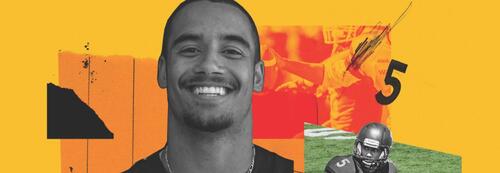
By Adam McGuire. This is an excerpt of an article originally published in the Spring 2022 issue of Waterloo Magazine.
It might seem strange to talk about Tre Ford’s talent, if only because the conclusion is so evident: of course Ford (BA ’22) has talent. He’s arguably the most talented player in the history of the Warriors football program.
The awards and accolades speak for themselves: Ford graduates this year with every school passing record and was twice named MVP of the Ontario University Athletics (OUA) conference. Ford became the first Warrior — and first Black quarterback from any school — to claim the prestigious Hec Crighton Trophy as the most outstanding university football player in Canada. Most recently, Ford was named the top male university athlete in Canada by U Sports.
Ford’s talent is obvious because he had an opportunity to develop it as a quarterback at Waterloo – along with a tireless work ethic and desire to perfect his craft. But historically, those leadership opportunities are less likely to be afforded to Black athletes.
Now, Ford is working to prove himself as a quarterback in the NFL or CFL. Ford was recently selected by the Edmonton Elks in the first round of the CFL draft. Ford has also been invited to rookie mini-camps for the Baltimore Ravens and New York Giants. Eventually, he’s hoping to become a football coach, where he can give other Black athletes those opportunities.
“It’s about, 'Who is in those roles of power?’ Quarterbacks often understand the game a little more, and they make good coaches. But if there are mostly white quarterbacks, that leads to mostly white coaches,” Ford says. “We need more Black people in roles of power to give those chances. It’s all about everyone getting the same opportunity to show what they can do.”
In that sense, football is a microcosm of life. The barriers placed in front of Black quarterbacks in football are like the ones Black, Indigenous and racialized people face in academia, industry and politics. Talent is supposed to be the currency of a true meritocracy, but there’s a problem with the equation: talent can be limited by the opportunity to exhibit it.
Success happens at the confluence of talent, opportunity and preparation. But sometimes, the opportunity tributary is dammed up and rerouted to benefit the dam-builders. It’s a self-perpetuating system designed to advance those who have had the greatest opportunity to succeed – not necessarily those with the most talent.
 Dr. Christopher Stuart Taylor is a history professor and the University’s associate vice-president of Equity, Diversity, Inclusion and Anti-racism who taught courses on Black history as part of the Arts First program at Waterloo. He earned a master’s degree and a PhD specializing in migration and ethnic relations. Taylor's research and teaching uses Critical Race Theory and Black Feminist Theory to uncover the “hidden histories” of race in Canada – including the history of race and racism in sport.
Dr. Christopher Stuart Taylor is a history professor and the University’s associate vice-president of Equity, Diversity, Inclusion and Anti-racism who taught courses on Black history as part of the Arts First program at Waterloo. He earned a master’s degree and a PhD specializing in migration and ethnic relations. Taylor's research and teaching uses Critical Race Theory and Black Feminist Theory to uncover the “hidden histories” of race in Canada – including the history of race and racism in sport.
“In football, if you’re fast and you’re Black, you’re either a wideout, or a cornerback,” Taylor says. “For a very long time, Black people couldn't be quarterbacks. They may have had physical talent, but people didn’t think they had intellectual talent. This parallels how Black people were – and are – seen in society.”
 Back in 2017, Tre and his twin brother Tyrell (BA in progress), who would become an all-star cornerback for the Warriors, were being heavily recruited out of A.N. Myer Secondary School in Niagara Falls, Ont. (During the 2022 CFL draft, Tyrell was drafted by the Winnipeg Blue Bombers.)
Back in 2017, Tre and his twin brother Tyrell (BA in progress), who would become an all-star cornerback for the Warriors, were being heavily recruited out of A.N. Myer Secondary School in Niagara Falls, Ont. (During the 2022 CFL draft, Tyrell was drafted by the Winnipeg Blue Bombers.)
But Tre was looking for more than athletics and academics; he wanted a chance to play quarterback. While some higher-profile programs wanted to convert Tre to a different position, Waterloo head coach Chris Bertoia (BA ‘05) knew he was a quarterback. “I told him he would be a quarterback for us, and that he and Tyrell were going to turn our program around,” Bertoia says.
“It was a big part of my decision,” Ford adds. “I wanted to play quarterback, and ‘Bert’ was willing to give me that opportunity.” With the Ford brothers and other star recruits, Waterloo won more games in their five-year career than in the ten years prior to their arrival.
For Bertoia, who was hired in 2015, the Ford brothers were critical to helping rebuild a football program that hit its lowest point in 2010, when the University suspended team operations for a year following an investigation into performance-enhancing drug use. The Warriors’ return to glory was helmed by a Black quarterback, and Taylor says that fact should not be lost on a society that still unjustly relates drug use to race.
“Black athletes in Canada have always had a target on their backs as probable ‘cheaters’ of their sport,” Taylor says. “Having a Black quarterback and other Black athletes bring the program back to relevance after the transgressions of white athletes sends a signal to the institution of sport that Black people do maintain the integrity of the sport.”
Read the rest of the article in Waterloo Magazine
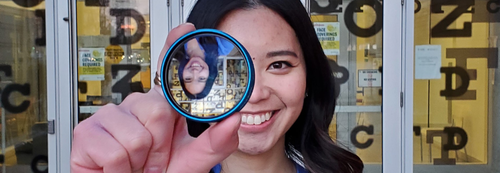
The School of Optometry & Vision Science’s 2021-2022 annual report is now live.
Compiling the School’s major achievements over the past year, this report reflects all the ways in which the School is working to achieve its overall strategic vision to “help people see.”
"I am proud to share with you the extraordinary accomplishments of the 2021/2022 academic year at the School of Optometry & Vision Science across our core missions: teaching, research and patient-centred care," writes Director Stanley Woo. "In our classrooms, in our labs, and in our research labs, our award-winning faculty continue to be leading experts in their fields. Ranked globally amongst the top 5 Optometry schools in research impact, our research programs have continued to thrive as we forged significant collaborative partnerships over the past year – across campus and abroad. Bringing together the best and brightest scientists, UWOVS is home to two world-class eye and vision research centres and boasts one of the largest vision science graduate programs in North America."
The report includes examples of research impact, academic excellence, patient-centred care, and donor contributions.
Read more at https://uwaterloo.ca/optometry-vision-annual-report/
Every year, the Canadian Council for the Advancement of Education (CCAE) hosts the Prix d'Excellence awards to celebrate outstanding achievements in alumni affairs, public affairs, communications, marketing, development, advancement services, stewardship and overall institutional advancement.
This year, Waterloo has won:
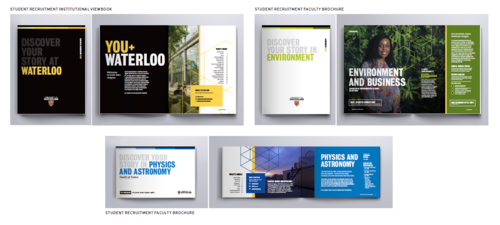
The Viewbook is the University of Waterloo's introduction to prospective students and provides a great overview of programs, co-op, admission requirements, student life, finances, and more. To request a copy of the viewbook, visit https://uwaterloo.ca/future-students/request-brochures.
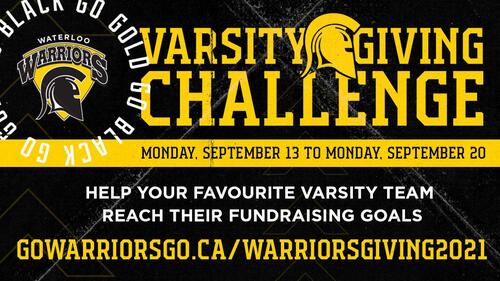
The Varsity Giving Challenge took place in September 2021. Varsity alumni, parents, family, friends and fans were invited to participate in the campaign.
A message from the Waterloo Cybersecurity and Privacy Institute.
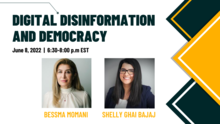 Digital disinformation is adversely impacting liberal societies. It spreads in less visible digital spaces, which ultimately undermines our democracy.
Digital disinformation is adversely impacting liberal societies. It spreads in less visible digital spaces, which ultimately undermines our democracy.
To learn more, join UWaterloo Cybersecurity and Privacy Institute for their next event, CPI Talk: Digital Disinformation and Democracy. This Zoom webinar will be held on Wednesday, June 8 from 6:30 to 8:00 p.m. (EST).
Hosts Bessma Momani and Shelly Ghai Bajaj will discuss:
Please register at: http://bit.ly/3Fe9lgJ
Since CPI Talks focuses on cybersecurity and privacy topics that concern the general public, CPI invites anyone to join, such as high school students and non-Waterloo staff. Attendees do not need prior knowledge to attend.
Dr. Bessma Momani is a full Professor in the Department of Political Science, Interim Associate Vice-President of Interdisciplinary and Sponsored Research, and senior fellow at the Centre for International Governance Innovation. Shelly Ghai Bajaj is a Postdoctoral Fellow working with Dr. Bessma Momani on projects relating to democracy, disinformation, and identity politics and the digital sphere.
The University's Board of Governors meets today at 1:30 p.m. on Microsoft Teams. Among the agenda items:
The Board will also receive the 2020-2025 Strategic Plan Thematic Spotlight on Research prepared by the Office of the President, which provides an overview of the Advancing Research for Global Impact theme of the University's strategic plan.
The President's Report also includes updates on the PART Report.
You can read the full agenda package on the Secretariat's website.
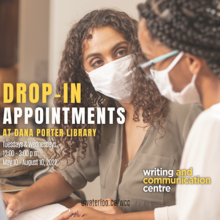 Not sure how to start that assignment? The peer tutors at the Writing and Communication Centre (WCC) can help. Visit WCC for in-person drop-in appointments at Dana Porter Library on Tuesdays and Wednesdays from 12:00 noon to 3:00 p.m.
Not sure how to start that assignment? The peer tutors at the Writing and Communication Centre (WCC) can help. Visit WCC for in-person drop-in appointments at Dana Porter Library on Tuesdays and Wednesdays from 12:00 noon to 3:00 p.m.
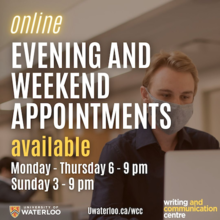 Evening and weekend appointments are an option, says the WCC. "Need some inspiration? Book a virtual evening or weekend appointment and work with our peer tutors on any aspect of your writing." Appointments are available Monday to Thursday from 6:00 to 9:00 p.m. and Sunday 3:00 p.m. to 9:00 p.m.
Evening and weekend appointments are an option, says the WCC. "Need some inspiration? Book a virtual evening or weekend appointment and work with our peer tutors on any aspect of your writing." Appointments are available Monday to Thursday from 6:00 to 9:00 p.m. and Sunday 3:00 p.m. to 9:00 p.m.
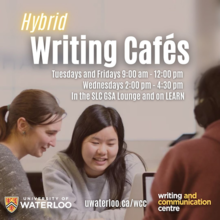 While we're on the subject, the Writing and Communication Centre (WCC) is calling all grads, postdocs, and faculty to connect with their peers and make progress on their writing at the Hybrid Writing Café. Sessions are held online and in the SLC Grad lounge on Tuesdays and Fridays from 9:00 a.m. to 12:00 noon and Wednesdays from 2:00 p.m. to 4:30 p.m.
While we're on the subject, the Writing and Communication Centre (WCC) is calling all grads, postdocs, and faculty to connect with their peers and make progress on their writing at the Hybrid Writing Café. Sessions are held online and in the SLC Grad lounge on Tuesdays and Fridays from 9:00 a.m. to 12:00 noon and Wednesdays from 2:00 p.m. to 4:30 p.m.
Students can visit the Student Success Office online for supports including academic development, international student resources, immigration consulting, leadership development, exchange and study abroad, and opportunities to get involved.
Instructors looking for targeted support for developing online components for blended learning courses, transitioning remote to fully online courses, revising current online courses, and more please visit Agile Development | Centre for Extended Learning | University of Waterloo (uwaterloo.ca).
Instructors can visit the Keep Learning website to get support on adapting their teaching and learning plans for an online environment.
Course templates are available within your course in LEARN to help you build and edit your content and assignment pages quickly.
The following workshops, webinars, and events are offered by the KL team (CTE, CEL, ITMS, LIB):
Scholarship of Teaching and Learning (SoTL) Methods – self-directed, continuous self-enrollment course in LEARN.
Independent Blended Course Design (iBlend) - self-directed, continuous self-enrollment course in LEARN.
Copyright Overview for Waterloo Instructors and Staff - self-directed, continuous self-enrollment course in LEARN.
Independent Remote Course Design Essentials (iReCoDE) - self-directed, continuous self-enrollment course in LEARN.
Supporting Student Mental Health (for Instructors) – self-directed, continuous self-enrollment course in LEARN.
SoTL Stories, June 15, 1:00 p.m. to 2:00 p.m.
Supports are available for employees returning to campus. Visit IST’s Hybrid Work and Technology guidelines and workplace protocols to assist with the transition.
The Writing and Communication Centre has virtual services and programs to help undergrads, grad students, postdocs and faculty members with academic writing.
Co-op students can get help finding a job and find supports to successfully work remotely, develop new skills, access wellness and career information, and contact a co-op or career advisor.
The Centre for Career Action (CCA) has services and programs to support undergrads, grad students, postdocs, alumni, and employees in figuring out what they value, what they’re good at, and how to access meaningful work, co-op, volunteer, or graduate/professional school opportunities. Questions about CCA's services? Live chat, call 519-888-4047, or stop by our front desk in the Tatham Centre 8:30 a.m. to 4:30 p.m., Monday to Friday.
Drop-in to Warrior Virtual Study Halls on Wednesdays from 5:30 p.m. to 7:00 p.m. Come together in this virtual space to set goals and work independently or in groups each week.
Renison's English Language Institute continues to offer virtual events and workshops to help students practice their English language skills.
If you feel overwhelmed or anxious and need to talk to somebody, please contact the University’s Campus Wellness services, either Health Services or Counselling Services. You can also contact the University's Centre for Mental Health Research and Treatment. Good2Talk is a post-secondary student helpline available to all students.
The Library is open with expanded hours for access to book stacks, drop-in individual study space, bookable group study rooms, drop-in access to computers and printers, book pick-up services and IST Help Desk support. Librarian consultations, Special Collections & Archives and the Geospatial Centre are available by appointment. Full details on current services and hours are available on the Library’s COVID-19 Update webpage.
The Faculty Association of the University of Waterloo (FAUW) continues to advocate for its members. Check out the FAUW blog for more information.
The University of Waterloo Staff Association (UWSA) continues to advocate for its members. Check out the UWSA blog for more information.
The Sexual Violence Prevention and Response Office (SVPRO) supports all members of the University of Waterloo campus community who have experienced, or been impacted, by sexual violence. This includes all students, staff, faculty and visitors on the main campus, the satellite campuses, and at the affiliated and federated Waterloo Institutes and Colleges. For support, email: svpro@uwaterloo.ca or visit the SVPRO website.
The Office of Indigenous Relations is a central hub that provides guidance, support, and resources to all Indigenous and non-Indigenous campus community members and oversees the University's Indigenization strategy.
The Waterloo Indigenous Student Centre, based at St. Paul’s University College, provides support and resources for Indigenous students, and educational outreach programs for the broader community, including lectures, and events.
WUSA supports for students:
Peer support - MATES, Glow Centre, RAISE, Women’s Centre - Visit https://wusa.ca/services/wusa-peer-support to book an appointment either in person or online for the Fall term.
Food Support Service food hampers are currently available from the Turnkey Desk 24/7 in the Student Life Centre. Drop off locations are also open again in SLC, DC, DP, SCH and all residences.
Co-op Connection all available online. Check https://wusa.ca for more details.
Centre for Academic Policy Support - CAPS is here to assist Waterloo undergraduates throughout their experience in navigating academic policy in the instances of filing petitions, grievances and appeals. Please contact them at caps@wusa.ca. More information is available.
WUSA Student Legal Protection Program - Seeking legal counsel can be intimidating, especially if it’s your first time facing a legal issue. The legal assistance helpline provides quick access to legal advice in any area of law, including criminal. Just call 1-833-202-4571.
Empower Me is a confidential mental health and wellness service that connects students with qualified counsellors 24/7. They can be reached at 1-833-628-5589.
GSA-UW supports for graduate students:
The Graduate Student Association (GSA-UW) supports students’ academic and social experience and promotes their well-being.
Advising and Support - The GSA advises graduate students experiencing challenges and can help with navigating university policies & filing a grievance, appeal, or petition.
Mental Health covered by the Health Plan - The GSA Health Plan now has an 80 per cent coverage rate (up to $800/year) for Mental Health Practitioners. Your plan includes coverage for psychologists, registered social workers, psychotherapists, and clinical counselors.
Dental Care - The GSA Dental Plan covers 60 to 70 per cent of your dental costs and by visiting dental professionals who are members of the Studentcare Networks, you can receive an additional 20 to 30 per cent coverage.
Student Legal Protection Program - Your GSA fees give you access to unlimited legal advice, accessible via a toll-free helpline: +1-833-202-4571. This advice covers topics including housing disputes, employment disputes, and disputes with an academic institution.
The Graduate House: Open Monday to Tuesday 11:30 a.m. to 7:00 p.m. and Wednesday to Friday 11:30 a.m. to 9:00 p.m. We’re open to all students, faculty, staff, and community members. The Graduate House is a community space run by the GSA-UW. We’re adding new items to the menu. Graduate students who paid their fees can get discounts and free coffee.
Warriors vs. Laurier Blood Donation Battle. Join our “Waterloo Warriors” team on the Blood.ca website or app. #ItsInYouToGive
TD Walter Bean Visiting Professorship: faculty & graduate student meetings, Monday, June 6 to Friday, June 10.
“Moving Forward by Slowing Down: Considering Diverse Perspectives on Drug Decriminalization and Legalization,” in person or online for the Waterloo community (online for the general public), Tuesday, June 7, 1:00 p.m. to 3:30 p.m. Keynote: Dr. João Goulão, Ministry of Health, Portugal. Followed by a panel moderated by Globe and Mail journalist André Picard.
Board of Governors meeting, Tuesday, June 7, 1:30 p.m., Microsoft Teams.
Master of Taxation Virtual Information Session, Wednesday, June 8, 4:00 p.m.
CPI Talk: Digital Disinformation and Democracy, Wednesday, June 8, 6:30 p.m., Zoom.
Building Respectful Research Relationships with Indigenous Communities Webinar, Indigenous History Month 2022, Thursday, June 9, 12:00 p.m.
Brubacher House Artist-in-Residence Workshops, "June Art Classes with Yulia Balobanova," Saturday, June 11, 3:30 p.m., BRH (Brubacher House, North Campus), for kids ages 6-10.
NEW - UW Staff Board Foundations workshop via MS Teams Session 003, Tuesday, June 14 from 11:30 a.m. to 1:30 p.m., Session 003 registration link.
The Daily Bulletin is published by Internal and Leadership Communications, part of University Communications
Contact us at bulletin@uwaterloo.ca
Submission guidelines
The University of Waterloo acknowledges that much of our work takes place on the traditional territory of the Neutral, Anishinaabeg, and Haudenosaunee peoples. Our main campus is situated on the Haldimand Tract, the land granted to the Six Nations that includes six miles on each side of the Grand River. Our active work toward reconciliation takes place across our campuses through research, learning, teaching, and community building, and is co-ordinated within the Office of Indigenous Relations.